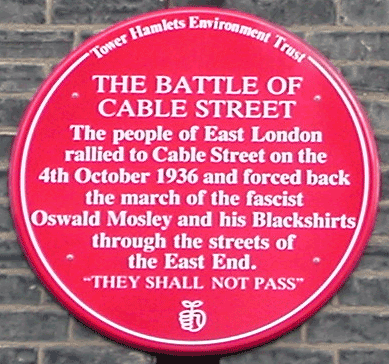The Battle of Cable Street
October 4th is the 70th anniversary of the Battle of Cable Street.
- On October the 4th 1936 Oswald Mosely led a march through Stepney.
What was wrong with this? I march. Hundreds and thousands march for Peace or to Make Poverty History or for Civil Rights or Equality. So what was wrong with this march? Why would 100,000 people sign a petition to stop the march? What had 310,000 people there? Why were there 6000 police in case of trouble?
- Oswald Mosely was a fascist, in fact head of the BUF (British Union of Fascists) and he wanted to march through Stepney which had mainly Jewish people living there.

The struggle I have is with 'Free Speech' - if we expect to have the right to express our views doesn't that mean we have to expect others to have the right to express their views too however much we might hate those views?
- Goebbels was in favor of free speech for views he liked. So was Stalin. If you're in favor of free speech, then you're in favor of freedom of speech precisely for views you despise. Otherwise, you're not in favor of free speech.Manufacturing consent:Noam Chomsky and the Media(1992).
When I think of the Battle of Cable Street I am torn. I am torn between the delight of the idea of thousands of people standing up against racism as I would with any stand against injustice. And between the question in my mind of whether I can really say then that I am a believer in Freedom of Speech.
Then I think, what would I have done? I certainly would have been there. I would be exercising my rights and wearing anti-fascist slogans and flying anti-fascist banners and shouting anti-fascist messages and songs. I might even have gone as far as pelting the odd person with rotton fruit and felt guilty after but I don't think that I would have thrown bottles or tried to physically hurt anyone.
But then I think of the What-ifs. What if no one had fought the BUF? What if the BUF were successfull in their march and intimididated the people of Stepney? What if people were so fearful of the BUF they let them get away with more and more. What if they BUF got to power. What if they were in power now?
Does the fact that this is not the case justify the way it came about? Do the ends justify the means? If what you want to achieve is good, does it matter if the things you do to achieve it aren't good? Do the ends justify the means? Aldous Huxley, a lifelong pacifist, thinks not in his collection of essays called Ends and Means. He does not agree with fighting violence with violence as happens so often. He believes there are other ways to change without using war or battle.
As he puts it:
- It is enormously difficult to change; but the enormously difficult is not the impossible.











3 Comments:
If people are not doing good things to acheive something good then is that thing they are trying to achieve actually good?!
but what if they try to achieve something good but not through good means...so what is achieved is good but how it is achieved isn't...is that ok?
How did Jesus resist? How did he advocate resistance?
Blessings,
Eleanor, TSSF (Novice) Penzance Corps, Cornwall.
Post a Comment
<< Home